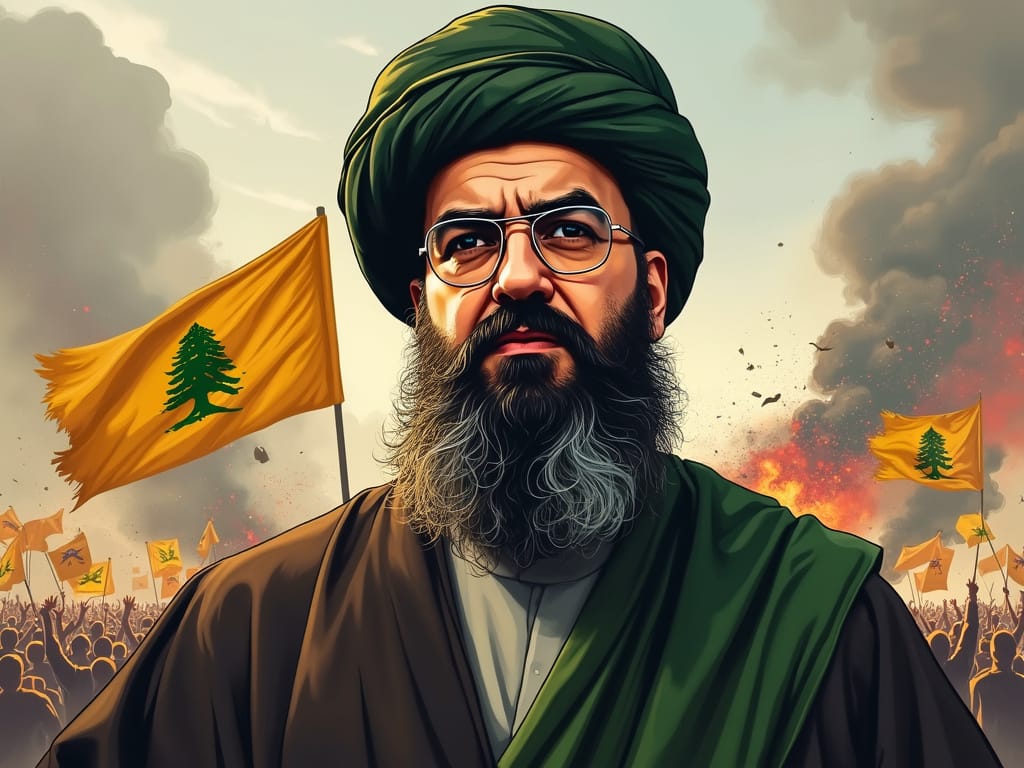

By Dr. Tim Orr
Hassan Nasrallah, the long-time leader of Hezbollah, was killed in an Israeli airstrike on Beirut in a significant escalation of the ongoing conflict between Israel and Hezbollah. Nasrallah, who led Hezbollah for over three decades, transformed the group from a small militia into a powerful paramilitary and political force in Lebanon with significant regional influence. His death marks a pivotal moment in the region's conflict dynamics, as Hezbollah has been a major player in the war against Israel, often coordinating with Iranian support.
The airstrike that killed Nasrallah also targeted several other senior Hezbollah leaders. This operation is seen as a critical blow to Hezbollah's leadership structure, raising questions about the group's ability to maintain its influence and conduct military operations, especially given the ongoing Israeli military campaign aimed at neutralizing Hezbollah's rocket capabilities. Israeli officials have stated that the airstrike was part of a broader strategy to degrade Hezbollah’s military infrastructure, which includes advanced missile systems.
Nasrallah’s death is expected to have major repercussions, not just within Lebanon but across the region. Hezbollah has vowed to continue its "holy war" against Israel, and Iran, a key backer of Hezbollah, may seek to retaliate. However, experts suggest Iran faces limitations in how far it can escalate without risking further conflict with Israel and the U.S.
Nasrallah was a symbolic figure for Hezbollah, credited with leading the group during pivotal moments such as the Israeli withdrawal from southern Lebanon in 2000 and the 2006 Lebanon War. His loss could destabilize Hezbollah's command structure and weaken its operational effectiveness, though the group still retains a significant arsenal of weapons. The situation remains fluid, with both Israel and Hezbollah preparing for further military actions that could expand the conflict into a broader regional war.
Who was Hassan Nasrallah?
Hassan Nasrallah was far more than the leader of Hezbollah; he was the architect of a sophisticated, ruthless, and deeply ideological terrorist organization that destabilized the Middle East and contributed to global terrorism. While many in the West view Nasrallah as a militant with a singular focus on Israel, his actions and influence stretched far beyond simple anti-Israel sentiment. Under Nasrallah's leadership, Hezbollah evolved into an international criminal syndicate and proxy army directly aligned with Iranian strategic interests.
1. Formation of Hezbollah’s Terrorist Foundation
Nasrallah took control of Hezbollah after Israel assassinated Abbas al-Musawi in 1992. He immediately sought to solidify the group’s dual identity as a paramilitary force and a political movement. Unlike many terrorist organizations that operate in the shadows, Nasrallah ensured Hezbollah gained political legitimacy in Lebanon. However, beneath the veneer of a political party, Hezbollah functioned as a brutal paramilitary force with a strong focus on anti-Israel terrorism. This was Nasrallah’s strategic genius: hiding behind the legitimacy of politics while advancing a global terrorist agenda.
From the beginning, Hezbollah was steeped in violence. In 1983, the group carried out the bombing of U.S. and French military barracks in Beirut, killing over 300 people. This was one of the deadliest terrorist attacks in U.S. military history, and it established Hezbollah as a force willing to target Western powers. Nasrallah inherited this legacy of violence and took it further, blending terrorism with a religious and political ideology that was tied to Iran’s revolutionary fervor.
Join Me on Patreon!
2. Global Network of Terrorism
Hezbollah’s activities under Nasrallah were not confined to Lebanon or Israel. Nasrallah expanded the group’s operations internationally, coordinating with Iran’s Islamic Revolutionary Guard Corps (IRGC) to create a global terrorist network. Hezbollah was implicated in multiple international terrorist attacks, including the 1994 bombing of the AMIA Jewish community center in Buenos Aires, which killed 85 people and injured hundreds more. Hezbollah’s fingerprints are found in acts of terror spanning continents—from South America to Africa and beyond—where the group’s clandestine networks conduct operations, smuggle drugs and engage in weapons trafficking.
In Europe, Hezbollah has been involved in financial crimes, including money laundering schemes that fund its military operations. Hezbollah’s global reach is unique in its integration of military, political, and financial operations, with Nasrallah presiding over this vast, complex apparatus. The U.S., EU, and several other nations have classified Hezbollah as a terrorist organization due to its involvement in attacks like the bombing of a bus full of Israeli tourists in Bulgaria in 2012.
3. Relationship with Iran and the Syrian Civil War
Nasrallah’s rise cannot be separated from his relationship with Iran. Hezbollah was effectively an extension of Iranian foreign policy, created by the IRGC in 1982 to spread the Iranian Islamic revolution to Lebanon. Nasrallah was a willing and committed proxy of Iran, consistently aligning Hezbollah’s activities with Tehran’s broader goals of undermining Western interests in the Middle East and opposing Israel. Under his leadership, Hezbollah received vast amounts of Iranian financial aid, military training, and sophisticated weaponry, transforming the group from a local militia into a heavily armed terrorist organization with a formidable arsenal of missiles aimed at Israel.
Nasrallah’s involvement in the Syrian Civil War also underscored his sinister nature. In 2013, Hezbollah openly intervened in the Syrian conflict to prop up Bashar al-Assad’s regime, leading to widespread atrocities. Nasrallah deployed thousands of Hezbollah fighters to Syria, where they played a pivotal role in Assad’s brutal crackdown on Syrian opposition forces. This intervention contributed to the deaths of thousands of Syrian civilians and further destabilized the region. Nasrallah justified this intervention as part of the "axis of resistance" against Israel and the West. Still, it was ultimately about ensuring Hezbollah’s survival and protecting its supply lines from Iran through Syria. His willingness to sacrifice Syrian lives in defense of this political calculus highlighted his cold, calculating nature.
4. Antisemitism and Use of Human Shields
Nasrallah was notorious for his deeply antisemitic rhetoric. He regularly called for the destruction of Israel and denied the Jewish people’s right to a state. In one of his most infamous speeches, Nasrallah said, "If they (Jews) all gather in Israel, it will save us the trouble of going after them worldwide." Statements like this demonstrate his genocidal intent, far beyond mere opposition to Israeli policy. His vision was one of outright elimination of the Jewish state, and his methods included relentless rocket barrages and terror attacks aimed at civilians.
Nasrallah’s use of human shields further underscored his disregard for civilian life, both Israeli and Lebanese. During the 2006 Lebanon War, Hezbollah launched thousands of rockets into northern Israel, deliberately targeting civilian areas while hiding its fighters and weapons among Lebanese civilians. This tactic of embedding military operations in residential areas was designed to increase civilian casualties, thus turning public opinion against Israel’s military response. Nasrallah cynically used Lebanese civilians as pawns in his war against Israel, knowing that their deaths would create international outrage and weaken Israeli resolve.
5. Legacy of Terror and Regional Destabilization
Nasrallah’s death in an Israeli airstrike is seen by many as a long-overdue end to one of the most dangerous terrorist masterminds in modern history. But his legacy lives on in the region’s continued instability. Hezbollah remains one of the most powerful forces in Lebanon, its arsenal largely intact despite Israeli efforts to degrade its capabilities. Nasrallah’s ability to blend terrorism with political legitimacy has made Hezbollah a model for other militant groups seeking power under the guise of "resistance." His death may destabilize Hezbollah temporarily, but the seeds of violence and terror he planted will likely continue to bear fruit.
Hassan Nasrallah was not a hero of resistance, as some may claim, but a terrorist leader whose actions caused untold suffering across the Middle East and beyond. His leadership of Hezbollah turned the group into a global force of terror, committed to the destruction of Israel and the spread of Iranian influence. His alliances with authoritarian regimes like Assad’s Syria and his brutal tactics, including the use of human shields and deliberate targeting of civilians, mark him as one of the most dangerous figures in recent Middle Eastern history. His death does not absolve Hezbollah of its crimes, nor does it erase the devastation he caused, but it does mark the end of one of the most sinister figures of our time.
Tim Orr is a scholar, Evangelical minister, conference speaker, and interfaith consultant with over 30 years of experience in cross-cultural ministry. He holds six degrees, including a master’s in Islamic studies from the Islamic College in London. Tim taught Religious Studies for 15 years at Indiana University Columbus and is now a Congregations and Polarization Project research associate at the Center for the Study of Religion and American Culture at Indiana University Indianapolis. He has spoken at universities, including Oxford University, the University of Tehran, and mosques throughout the U.K. His research focuses on American Evangelicalism, Islamic antisemitism, and Islamic feminism, and he has published widely, including articles in Islamic peer-reviewed journals and three books.
 YouTube
YouTube
Sign up for Dr. Tim Orr's Blog
Dr. Tim Orr isn't just your average academic—he's a passionate advocate for interreligious dialogue, a seasoned academic, and an ordained Evangelical minister with a unique vision.
No spam. Unsubscribe anytime.
